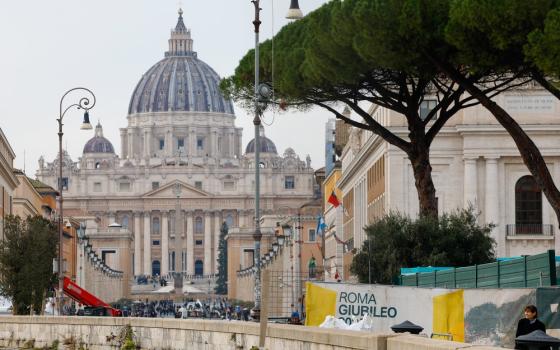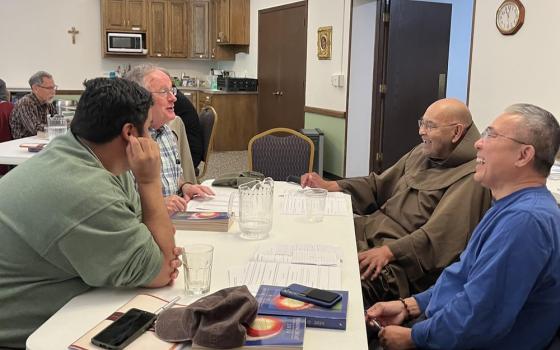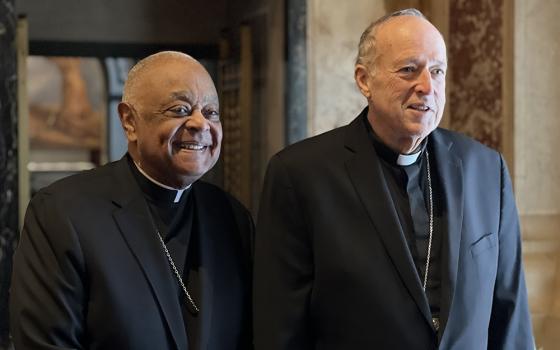
The archbishop of Port-au-Prince, Monsignor Joseph Serge Miot, died in the Haiti earthquake along with unknown thousands of victims, Catholic News Services has reported. Miot was 63.
"The lifeless body of Archbishop Joseph Miot of Port-au-Prince was found this morning under the rubble of the archbishops' residence," L'Osservatore Romano said in a Page 1 story Jan. 13, according to CNS.
Meanwhile, the Haitian capital of Port-au-Prince remained in a state of disorder and confusion at mid-afternoon Jan. 13 and little information was available on the number of casualties resulting from a devastating earthquake, a spokesman for Catholic Relief Services said.
"It is chaos there. Nobody knows how many people are killed or injured at this point," John Rivera, CRS director of communications, told Catholic News Service.
Meanwhile, seriously injured Americans were being evacuated throughout the day Jan. 13. U.S. Secretary of State Hillary Rodham Clinton said a military team was on the ground assessing the situation in preparation for the U.S. response to the devastating natural disaster.
Detailed reports of casualties nearly a day after the magnitude 7 quake shook the area around the capital were limited because telephone, cell phone and Internet services were sporadic.
In addition, rescue and recovery efforts were limited because of a lack of emergency equipment and heavy machinery. People were reported to be digging through rubble by hand in heroic efforts to rescue people and recover bodies.
The few casualty reports that were received came during brief exchanges between Americans working in Haiti on a variety of projects and their sponsors in the U.S.
Emily Smack, executive director of Haitian Ministries for the Diocese of Norwich, Conn., said three staff people were injured, two severely, when the program's mission house in Port-au-Prince was leveled during the quake.
Americans Jillian Thorp, acting director of the program, and consultant Chuck Dietsch were trapped under debris for nearly 10 hours until co-workers were able to free them, Smack reported. Thorp was badly bruised and cut while Dietsch suffered a broken leg and broken ribs.
The third staff member, a cook who has been with the program for 22 years, was on the first floor of the house when it collapsed. She lost one leg and was in danger of losing her other leg, Smack said.
"I talked with our assistant director who helped dig them out and he said no matter which way you look it's just crumpled houses," she said.
The program supports two orphanages, housing a total of 108 children. Smack said staff members were unaware of how the orphanages fared but were hoping to make their way across town to check on them at some point Jan. 13.
Catholic News Service reported Bishop Auza said he had toured the capital on the morning after the earthquake and found the country's ministry buildings, schools and supermarkets destroyed. He said the headquarters of the U.N. stabilization force in Port-au-Prince had completely collapsed, reportedly trapping hundreds in the debris.
"I found priests and nuns on the street, who no longer have homes. The rector of the seminary survived, and so did the dean, but the seminarians are under the rubble. Everywhere there are cries coming from under the rubble," he said.
He said a study institute for men and women religious had collapsed, with many students inside as they attended a conference. The nunciature withstood the quake, and there were no injuries there, he said.
"We cannot enter or stay inside for very long because the earth continues to tremble. So we're camped out in the garden," he said.
Caritas Internationalis, the Vatican-based umbrella organization for Catholic charities, said it was mobilizing to provide immediate assistance to Haiti. On Jan. 13 it had already assembled an emergency relief team to fly to Haiti to assist Caritas members already working in the country. It said there had not yet been contact with the Haitian Caritas office.
Caritas Internationalis humanitarian director Alistair Dutton was leading the emergency relief team, Caritas said in a statement.
"There is a strong Caritas presence in Haiti. We already know that Caritas staff will be providing support to survivors of the earthquake, such as food, shelter and comfort through churches and parish networks," Dutton said.
"A priority for Caritas will be to assess the damage and our local capacity to provide aid to survivors of the quake. Caritas runs more than 200 hospitals and medical centers in Haiti. It is experienced and prepared to respond to humanitarian disasters there as a result of the frequent hurricanes," he said.
"Communication with our staff on the ground is difficult, but we are piecing together a picture of desperate need. Haiti is the poorest country in the Western Hemisphere. Conflict, recent natural disasters, and poverty have left Haitians with weak infrastructure. Working in that environment will be difficult," he said.
In its statement, Caritas said the cathedral in the Haitian capital of Port-au-Prince was badly damaged.
Caritas also said the U.S.-based Catholic Relief Services had been in communication with its staff in Haiti. The local CRS office was still standing and CRS staff present at the time of the quake were safe, it said. CRS staff described the quake as "a major hit ... a direct hit."
Meanwhile, Pope Benedict XVI urged generous international aid for the victims of Haiti's earthquake and has pledged concrete help from the Catholic Church.
Benedict also asked prayers for the victims and assured all those who were suffering that he was spiritually close to them. He "implored God for consolation and relief in their suffering."
Benedict said he wanted to make an appeal to the generosity of all "so that our concrete solidarity and the effective support of the international community will not be lacking for these brothers and sisters who are living a moment of need and pain."
He made the appeal during his weekly general audience Wednesday.
International efforts to help Haiti in the wake of yesterday's 7.0 magnitude earthquake are under way, with governments across the world and aid agencies mobilising search and rescue teams and aid supplies.
Although the full scale of the disaster has yet to emerge, it is clear that it will pose a huge challenge.
Haiti is the poorest country in the western hemisphere and is still struggling to recover from devastating hurricanes in 2008.
Catholic Relief Services, active in Haiti, is among the aid groups collecting donations to assist earthquake victims.
From the News Wires


